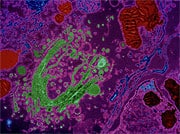Life Extension Magazine®
A novel carotenoid can do something scientists had long thought was impossible—trigger the burning (or thermogenesis) of white body fat—without producing stimulatory effects. In addition to inducing significant weight loss in human study subjects, this plant extract has been shown to improve blood markers associated with vascular and inflammatory disorders. Why is burning white body fat so critical? Because new studies show there is a significant decrease in resting energy expenditure as humans age. If you’ve ever wondered why diet and exercise so often fails to produce meaningful weight loss, scientific research shows that with normal aging, metabolism slows significantly, while white body fat mass increases. Up until now, people seeking to boost their resting metabolic rate had to rely on compounds that produced unpleasant stimulating effects. That has all changed with the discovery of a new carotenoid that safely increases resting energy expenditure at the cellular level—with none of the side effects associated with high-dose ephedra. In this article, we look at the recent studies that document the impressive ability of this carotenoid to reduce body fat while simultaneously providing a range of life-saving health benefits. Fucoxanthin: The New CarotenoidHuman health is highly reliant on the ingestion of plant carotenoids. For example, inadequate intake of the carotenoids lutein and zeaxanthin can result in the development of macular degeneration—the leading cause of blindness in the elderly. Fucoxanthin is a carotenoid derived from a special seaweed that has been extensively studied for its antioxidant powers.1-3 Animal studies have demonstrated its beneficial effects in stroke prevention,4 reduction of inflammation,5 and slowing the growth of various cancer cell types.6-10 Based on this information alone, fucoxanthin would be an effective nutritional supplement to add to one’s daily program. It is the favorable effect on cell energy expenditure, however, that gives fuco-xanthin its remarkable fat-reducing properties. Fucoxanthin facilitates youthful energy meta-bolism by activating a special cellular protein called mitochondrial uncoupling protein 1 (or UCP1). As you will soon read, mitochondrial uncoupling protein 1 promotes the natural removal (metabolic burning) of white fat stored in the body. A Serendipitous FindingA group of Japanese marine biologists11 discovered during their research that when study animals were supplemented with fucoxanthin, something unexpected occurred—mitochondrial uncoupling protein 1 (UCP1) was expressed in white adipose (fat) tissue. This unique protein (UCP1) is normally only active in brown fat, a type of fat that is capable of non-shivering thermogenesis, a process that ultimately results in an increase in metabolic rate by “uncoupling” energy transfer in the cells. White fat, on the other hand, often accumulates excessively in human bodies as we age, and white fat generally does not express UCP1 to any appreciable degree. What this means is that fucoxanthin can help white adipose tissue mimic some of the thermogenic properties of brown fat, ultimately resulting in a safe increase in metabolic rate and enhanced fat-burning.
In the experiment, these scientists fed fuco-xanthin-rich extracts from edible seaweed to rats and mice and then measured the weight of white adipose tissue in the animals’ abdomens. A diet containing the same calorie content was fed to a second set of animals that served as the control group. In the fat tissue of the animals who were given fucoxanthin, the scientists found noticeable increases in the expression of the fat-burning protein UCP1. In the control animals who did not receive fucoxanthin, little UCP1 expression occurred in their fat. The fucoxanthin-supplemented animals demonstrated significant loss of white adipose tissue weight, whereas there was no weight loss at all in animals fed the control diet.11 The same researchers then turned their attention to the effects of fucoxanthin and its derivatives on fat cell formation in cultured cells. Treatment of pre-adipocytes (cells that will eventually become fat cells) with fucoxanthin prevented lipid (fat) accumulation inside the developing cells. It was also converted by the cells into a compound, fucoxanthinol, which prevented the cells from “growing up” into mature fat cells.12 In essence, fucoxanthin stopped fat in its tracks. Evidence that fucoxanthin reduces the growth of new blood vessels in adipose tissue suggests that this may be another mechanism by which the seaweed derivative blocks development of new fat stores.13 Reduced Blood Sugar Levels
These prolific researchers then examined the combination of fucoxanthin and fish oil on white adipose (fat) tissue weight and blood glucose in obese mice with type 2 diabetes.14 Mice were supplemented for four weeks with fucoxanthin alone, fucoxanthin plus fish oil, or a control diet with the same calorie content. Fucoxanthin alone markedly reduced gain in white fat tissue weight compared with controls, while the animals given fucoxanthin and fish oil had still further reductions in weight gain. Groups receiving either fucoxanthin alone or fucoxanthin plus fish oil experienced significant reductions in blood glucose and plasma insulin concentrations, as well as in inflammatory markers such as TNF-alpha—all highly beneficial effects in this animal model of the human metabolic syndrome (which is so often characterized outwardly as abdominal obesity)! Altering The Fat-Making ProcessThe exact mechanism by which fucoxanthin reduces body fat is still undergoing scientific evaluation, but we know that it has to do with the process by which the body normally transfers and stores energy, known as “coupling.”11
Under normal circumstances, chemical energy from food is poured into molecules of adenosine triphosphate (ATP), which are then used by cells for energy.15 Any unused energy from the ATP molecules is stored for future use through the formation of new fat molecules. This is why people who consume more calories than they expend end up gaining weight in the form of fat. Then, when the body’s caloric needs increase (say, with increased exercise), fat molecules are broken down and their stored energy is put back into new ATP molecules which provide it to working cells. Scientists refer to this entire process as “coupling,” which efficiently transforms chemical energy to physical energy and back again.15-17 Under normal circumstances, this process is highly efficient within the body. It is during this “fat-making process” that fuco-xanthin can have a beneficial influence on the mechanism that causes so many people to gain unhealthy weight in the form of fat. Fucoxanthin induces the production of a protein that “uncouples” cellular energy transfer so the body is less efficient at converting food energy into fat.18 In the human body, excess energy (calories) is stored in the form of white fat. An increase in metabolic rate can allow the burning of ingested calories and promote the removal of stored body fat. Interestingly, animals—especially those that hibernate—have a different kind of fat (brown fat) that enables them to keep warm without physical movement through the fat-burning process. This process was considered impossible for non-infant humans, because adult humans largely have white fat that was not previously believed to possess the same properties as brown fat. The remarkable “uncoupling” properties of fucoxanthin essentially allow white fat cells to mimic some of the properties of brown fat and increase resting energy expend-iture, therefore relying on the burning of stored body fat for fuel.
Impressive Human StudiesBut what about fucoxanthin in humans? While research is in its early stages, evidence suggests that when humans supplement with fucoxanthin, they may induce the expression of UCP1 in their stores of white fat, just as the animals did in the Japanese studies.24-28 In the words of one researcher, this makes fucoxanthin an attractive new target for “pharmacological management of complex pathological syndromes such as obesity, type 2 diabetes or chronic inflammatory diseases.”27
Two groups of researchers are leading the way by studying how fucoxanthin supplements affect fat stores in human subjects. These studies are so recent that they haven’t yet even appeared in print, but we were given the opportunity to review the completed data analyses and report some of the most exciting results here. The first study was aimed at determining the effects of fucoxanthin supplements, in combination with pomegranate seed oil, on energy expenditure rate in obese, non-diabetic female volunteers.28 Subjects ingested supplements before meals daily for 16 weeks, and all participants were placed on a controlled 1,800-calorie/day diet. Their energy expenditure rate (how much energy their bodies produced over time) was measured using a standard procedure known as indirect calorimetry. The results were nothing short of astonishing—subjects who took fucoxanthin plus pomegranate seed oil generated greater absolute increases in energy expenditure. These researchers concluded that the combination of fucoxanthin and pomegranate seed oil can significantly increase metabolism and could well have profound anti-obesity properties. That conclusion was put to the test by the second research group, who studied the impact of the fuco-xanthin-pomegranate seed oil combination on body weight, body and liver fat content, and a variety of plasma risk factor markers in a group of obese, non-diabetic women.18,28,29 The 110 subjects in this placebo-controlled study were randomized into two groups who received the following:
Outstanding ResultsSit down for these results—they are stunning. After six weeks on the supplements, there was a statistically significant reduction in body weight in the supplemented group who had normal liver fat content, and by eight weeks the fatty-liver group was also showing significant weight loss, compared with placebo. By the end of the 16-week study, women with fatty livers had lost an average of more than 15 pounds, compared with just three pounds in their placebo-supplemented peers! The normal liver-fat group had similar results, losing an average of nearly 14 pounds, compared with just over three pounds in the placebo group.29 In other words, both active groups lost just under a pound a week over the entire study period, which is a healthy, sustainable, and realistic rate of weight loss.
Weight loss alone is not the only or even the best marker of improvement in the risks posed by fat. Supplemented patients in this study also demonstrated a significant reduction in visceral fat. Visceral fat is the type of fat that covers the organs of the abdominal cavity like the liver. No patient in this study reported any side effects. Please note that pomegranate seed oil contains different constituents and functions differently in the body than pomegranate juice extracts. Why Boosting Metabolic Rate Is So CriticalHumans have a unique ability to store ingested calories in the form of white body fat. This fat-storage propensity saved countless lives during past famines, but has become a curse in today’s world of food abundance.
Virtually everyone with excess body fat has tried various diet and exercise programs. The failure rate of relying on these approaches alone is documented by the large numbers of overweight and obese individuals today. A major reason why maturing humans accumulate excess body fat is that the aging process itself is associated with a dramatic drop in metabolic energy expenditure (i.e., calorie burning). Findings from a recent published study show that aging humans suffer a greater than predicted decrease in resting energy expenditure.30 This helps explain why dieting alone so often fails to provide long-term weight control, and why it is so critical for aging humans to boost resting metabolic rate if they are to lose significant body fat stores. SummaryUp until now, those seeking to shed excess body fat had to endure miserable diets that usually produced only mediocre results. While compounds have been available that increased resting energy expenditure rates, their stimulating side effects were so unpleasant that people could not take optimal doses, or even tolerate them on a consistent basis. With the discovery of the non-stimulating metabolic-enhancing effects of fucoxanthin, those seeking to achieve optimal long-term weight control have a potent new weapon that functions to program the mitochondria contained in white adipose cells (fat cells) to “uncouple” cellular energy transfer, with the result being an increase in resting energy expenditure and metabolic rate. Unlike products that produce undesirable side effects, fucoxanthin has demonstrated remarkable health benefits that may lower one’s risk of heart disease, diabetes, and even cancer. Fucoxanthin thus functions as a critical adjunct to enable controlled calorie intake and increased physical activity to produce meaningful fat-loss effects in aging humans. If you have any questions on the scientific content of this article, please call a Life Extension Health Advisor at 1-800-226-2370. | ||||||||||
| References | ||||||||||
| 1. Yan X, Chuda Y, Suzuki M, Nagata T. Fucoxanthin as the major antioxidant in Hijikia fusiformis, a common edible seaweed. Biosci Biotechnol Biochem. 1999 Mar;63(3):605-7. 2. Nishino H, Murakosh M, Ii T, et al. Carotenoids in cancer chemoprevention. Cancer Metastasis Rev. 2002;21(3-4):257-64. 3. Sachindra NM, Sato E, Maeda H, et al. Radical scavenging and singlet oxygen quenching activity of marine carotenoid fucoxanthin and its metabolites. J Agric Food Chem. 2007 Oct 17;55(21):8516-22. 4. Ikeda K, Kitamura A, Machida H, et al. Effect of Undaria pinnatifida (Wakame) on the development of cerebrovascular diseases in stroke-prone spontaneously hypertensive rats. Clin Exp Pharmacol Physiol. 2003 Jan;30(1-2):44-8. 5. Shiratori K, Ohgami K, Ilieva I, et al. Effects of fucoxanthin on lipopolysaccharide-induced inflammation in vitro and in vivo. Exp Eye Res. 2005 Oct;81(4):422-8. 6. Yoshiko S, Hoyoku N. Fucoxanthin, a natural carotenoid, induces G1 arrest and GADD45 gene expression in human cancer cells. In Vivo. 2007 Mar;21(2):305-9. 7. Hosokawa M, Kudo M, Maeda H, et al. Fucoxanthin induces apoptosis and enhances the antiproliferative effect of the PPARgamma ligand, troglitazone, on colon cancer cells. Biochim Biophys Acta. 2004 Nov 18;1675(1-3):113-9. 8. Kotake-Nara E, Terasaki M, Nagao A. Characterization of apoptosis induced by fucoxanthin in human promyelocytic leukemia cells. Biosci Biotechnol Biochem. 2005 Jan;69(1):224-7. 9. Kotake-Nara E, Asai A, Nagao A. Neoxanthin and fucoxanthin induce apoptosis in PC-3 human prostate cancer cells. Cancer Lett. 2005 Mar 18;220(1):75-84. 10. Konishi I, Hosokawa M, Sashima T, Kobayashi H, Miyashita K. Halocynthiaxanthin and fucoxanthinol isolated from Halocynthia roretzi induce apoptosis in human leukemia, breast and colon cancer cells. Comp Biochem Physiol C Toxicol Pharmacol. 2006 Jan;142(1-2):53-9. 11. Maeda H, Hosokawa M, Sashima T, Funayama K, Miyashita K. Fucoxanthin from edible seaweed, Undaria pinnatifida, shows antiobesity effect through UCP1 expression in white adipose tissues. Biochem Biophys Res Commun. 2005 Jul 1;332(2):392-7. 12. Maeda H, Hosokawa M, Sashima T, et al. Fucoxanthin and its metabolite, fucoxanthinol, suppress adipocyte differentiation in 3T3-L1 cells. Int J Mol Med. 2006 Jul;18(1):147-52. 13. Sugawara T, Matsubara K, Akagi R, Mori M, Hirata T. Antiangiogenic activity of brown algae fucoxanthin and its deacetylated product, fucoxanthinol. J Agric Food Chem. 2006 Dec 27;54(26):9805-10. 14. Maeda H, Hosokawa M, Sashima T, Miyashita K. Dietary combination of fucoxanthin and fish oil attenuates the weight gain of white adipose tissue and decreases blood glucose in obese/diabetic KK-Ay mice. J Agric Food Chem. 2007 Sep 19;55(19):7701-6. 15. Ebenhoh O, Heinrich R. Evolutionary optimization of metabolic pathways. Theoretical reconstruction of the stoichiometry of ATP and NADH producing systems. Bull Math Biol. 2001 Jan;63(1):21-55. 16. Oplatka A. A new outlook on the energetics of muscle contraction. Biophys Chem. 2000 Jul 31;86(1):49-57. 17. Russell JB. The energy spilling reactions of bacteria and other organisms. J Mol Microbiol Biotechnol. 2007;13(1-3):1-11. 18. Haynie DT. Biological Thermodynamics. Cambridge University Press; 2001. 19. Krug AW, Ehrhart-Bornstein M. Newly discovered endocrine functions of white adipose tissue: possible relevance in obesity-related diseases. Cell Mol Life Sci. 2005 Jun;62(12):1359-62. 20. Cannon B, Houstek J, Nedergaard J. Brown adipose tissue. More than an effector of thermogenesis? Ann NY Acad Sci. 1998 Sep 29;856:171-87. 21. Nedergaard J, Bengtsson T, Cannon B. Unexpected evidence for active brown adipose tissue in adult humans. Am J Physiol Endocrinol Metab. 2007 Aug;293(2):E444-52. 22. Cannon B, Nedergaard J. Brown adipose tissue: function and physiological significance. Physiol Rev. 2004 Jan;84(1):277-359. 23. Saito S, Saito CT, Shingai R. Adaptive evolution of the uncoupling protein 1 gene contributed to the acquisition of novel nonshivering thermogenesis in ancestral eutherian mammals. Gene. 2007 Oct 23. 24. Tiraby C, Tavernier G, Lefort C, et al. Acquirement of brown fat cell features by human white adipocytes. J Biol Chem. 2003 Aug 29;278(35):33370-6. 25. Trayhurn P. The biology of obesity. Proc Nutr Soc. 2005 Feb;64(1):31-8. 26. Hansen JB, Kristiansen K. Regulatory circuits controlling white versus brown adipocyte differentiation. Biochem J. 2006 Sep 1;398(2):153-68. 27. Nubel T, Ricquier D. Respiration under control of uncoupling proteins: Clinical perspective. Horm Res. 2006;65(6):300-10. 28. Ramazanov, Z. The effect of Xanthigen, a phytomedicine containing fucoxanthin and pomegranate seed oil in obese non-diabetic female volunteers: a double-blind, randomized and placebo-controlled trial. Submitted for publication 2008. 29. Ramazanov, Z. Effect of Fucoxanthin and Xanthigen™, A phytomedicine containing fucoxanthin and pomegranate seed oil, on energy expenditure in obese non-diabetic female volunteers: a double-blind, randomized and placebo-controlled trial. Submitted for publication 2008. 30. Alfonzo-Gonzalez G, Doucet E, Bouchard C, Tremblay A. Greater than predicted decrease in resting energy expenditure with age: cross-sectional and longitudinal evidence. Eur J Clin Nutr. 2006 Jan;60(1):18-24. |





